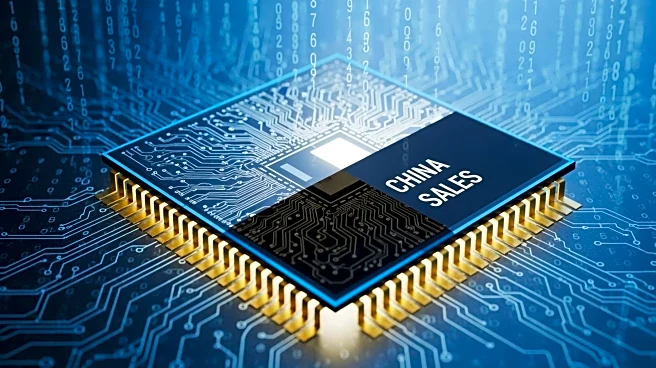What's Happening?
Dutch tech giant ASML has reported stable profits for the third quarter of 2025, with net profits reaching 2.13 billion euros, slightly up from 2.08 billion euros in the same period last year. The company,
known for its advanced semiconductor manufacturing machines, has forecasted a 15% increase in total net sales for the year. However, ASML has warned of a significant decline in its China business in 2026 due to export restrictions imposed by the US and Dutch governments. These curbs are part of ongoing geopolitical tensions, as Western nations aim to limit China's access to high-tech chips that could be used for military purposes. Despite these challenges, ASML remains optimistic about its long-term growth, driven by the expanding AI market, which is expected to boost annual sales to between 44 and 60 billion euros by 2030.
Why It's Important?
ASML's situation highlights the broader geopolitical struggle over semiconductor technology, a critical component in modern electronics and military equipment. The company's warning about declining sales in China underscores the impact of international trade restrictions on global tech companies. As semiconductors become a focal point in geopolitical conflicts, companies like ASML are caught in the crossfire, affecting their business strategies and market performance. The anticipated decline in China sales could have significant implications for ASML's revenue and the semiconductor industry at large, potentially influencing global supply chains and technological advancements.
What's Next?
ASML plans to provide more details on its 2026 outlook in January, as it navigates the challenges posed by geopolitical tensions. The company is expected to focus on expanding its presence in other markets and leveraging the growth of the AI sector to offset potential losses in China. Meanwhile, the semiconductor industry will likely continue to be a geopolitical battleground, with countries striving to secure their technological independence and dominance. ASML's future strategies and market performance will be closely watched by investors and industry stakeholders.
Beyond the Headlines
The situation with ASML reflects the ethical and strategic dilemmas faced by tech companies operating in a politically charged environment. Balancing business interests with national security concerns poses a complex challenge, as companies must navigate regulatory landscapes while maintaining competitive advantages. The long-term implications of these geopolitical tensions could reshape the semiconductor industry, influencing innovation, collaboration, and market dynamics.









